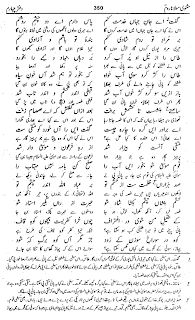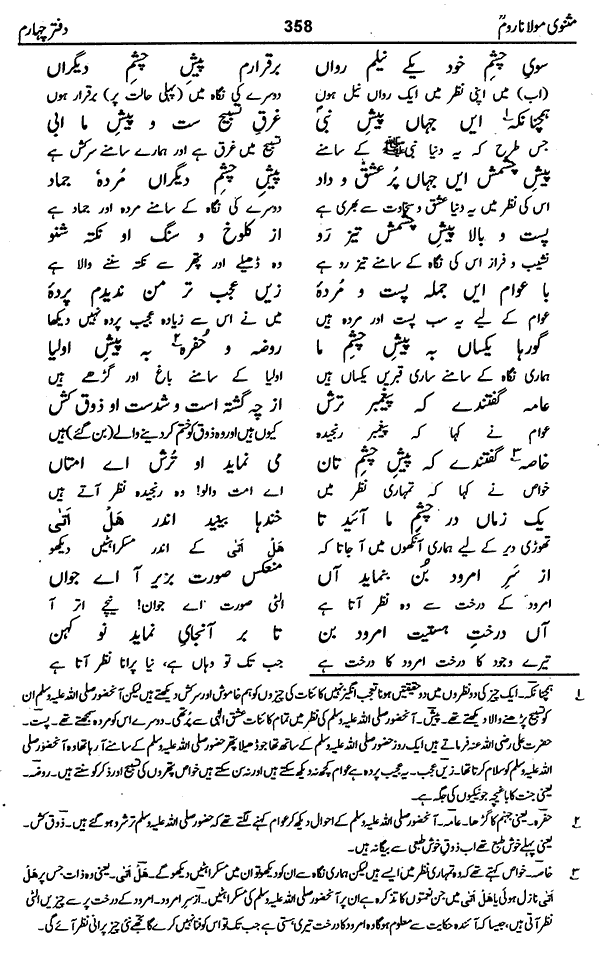How the Egyptian entreated the Israelite, saying, “Of
yours own intention fill a jug from the Nile and put it to my lips, that I may drink. (I beseech thee) by the right of friendship and brotherhood; for the jug which ye Israelites fill from the Nile for yourselves is pure water, while the jug which we Egyptians fill is pure blood.”
I heard
that an Egyptian, on
account of thirst, came
into the house of an Israelite. He said, “I am
your friend and kinsman: to-day I have become
in need of
you,
Because Moses wrought
sorcery and enchantments, so that he
made the water of the
Nile to be
blood for us.
The Israelites drink pure
water
from it, (but)
to
the Egyptians the water
has become blood from
the spell laid on our eyes.
Fill one cup with
water for yourself, that this old friend may drink of
your water.
When you fillest
that cup for
yours own sake, ’twill not be blood, ’twill
be
water pure and free
(from taint).
I too will drink the water as
your parasite; for a parasite,
in following (his host),
is
relieved from anguish.”
He (the Israelite)
said, “O (you who
art to me as) soul and
world, I will do (this) service (for
thee); I will
pay (you) regard (in
this matter), O (you
who art as)
my
two bright eyes!
He filled the cup with
water from the Nile, put it to his lips, and
drank one half (of the
water).
(Then) he tilted the
cup towards him who
craved the water, saying, “Drink you too!” That
(water) became black blood.
Again he tilted it on this side
(towards himself): the blood became
water (once more).
The
Egyptian was enraged and
incensed.
He sat down awhile till his anger
departed; after
that, he said to him, “O mighty sword (of the
Faith),
he that is God-fearing
drinks this
(water).”
The God-fearing man is he that
has become quit of (has renounced) the way of
Pharaoh and has become like unto Moses.
Become (as) the people of Moses and drink this water; make peace with the Moon and behold
the moonbeams.
There are a hundred thousand darknesses in yours eye
(which arise) from your wrath against the servants of God.
Extinguish wrath, open
the
(spiritual) eye, rejoice, take a lesson
from
(true) friends, become a
teacher (of the Truth).
How should a mountain go into the cavity
(eye) of a needle, unless indeed
it become a
single thread?
By asking forgiveness (of
God) make the mountain (like) a straw, and (then)
take joyously
the
cup of the forgiven and
drain (it) joyously!
Inasmuch as God has made
it unlawful to the unbelievers, how wilt
you drink of it (whilst you art endued) with this imposture?
How should the
Creator of
imposture buy (accept)
your imposture, O fabricator of
fiction?
Will the water
dare to turn aside from the
command of the
Lord and bestow
refreshment on the unbelievers?
Or do you suppose that
you art eating bread?
You art eating
snake-venom and (that
which
causes) wasting
away of the spirit.
How should bread
restore to health the spirit that averts its
heart from the
command of the
Beloved Spirit?
Or do you suppose that when
you readest the words of the Mathnawí you hearest them gratis (without giving aught in return)?
It comes in,
but, like fables, it shows (only)
the
husk, not the
kernel of the berries,
(As) a sweetheart who has drawn a veil
over her head and
face and has hidden
her face from yours eye.
By reason of contumacy the Sháhnáma or Kalíla seems to
you just like the Qur’án.
The difference
between truth
and falsehood
is (visible) at the moment
when the collyrium of
(Divine) favour opens the eye;
His aim is to divert
himself from
ennui (by reading such books), and neglect the
Word of the
Almighty,
That by means of that (entertaining) discourse
he may quench the fire of distress and anxiety and
provide a cure (for his malady).
For the purpose of
quenching this amount of
fire, pure water
and urine are
alike in skill (are equally serviceable).
Both this
urine and (this)
water will quench the fire of distress,
just as (it is quenched)
during sleep.
All distress will vanish from the soul, and
the heart will find its way to the Rose-garden,
Because every one who
catches a scent
of the mystery
of the (Divine) scriptures flies into an orchard with a running brook.
Or do you suppose that
we see the face
of the Saints as it is (in reality)?
Hence the
Prophet remained in astonishment, saying,
“How are the true
believers not seeing my face?
And if they are
seeing (it), wherefore is this perplexity?”—
until a revelation came
(to him from
God), saying, “That face is
in
concealment.
In relation to
you it is the moon, and in relation to the people it is the cloud, in order that the infidel may not see
your face for
nothing.
In relation
to you it is the bait, and in relation to the people it is the trap,
in
order that the
vulgar may not drink
of
this chosen wine.”
God said, “You seest them looking,” (but) they are (like) the
pictures in a bathhouse: they do not see.
Wherefore is this goodly image
(so) very irresponsive that it does not say ‘alayk (on you be peace!) in reply to
my salaam?
It does not nod its head and
moustache generously in regard
for my having made a hundred
prostrations before it.”
God, though He does not nod
the
head outwardly, (yet)
in regard for
that (worship
of
Him)
bestows an inward delight,
(If) you serve Intellect in earnest,
the regard of Intellect (for thee)
is (shown by this), that it
increases (your) righteousness.
God does not nod the
head to you outwardly, but He makes
you a prince over the princes
(of the world).
To you God gives secretly something
(of such power) that the
people of the world bow down before you,
Just as He gave to a stone such
virtue that it was honoured by His creatures: that is to say, (it became) gold.
The body is earth; and
when God gave it a spark (of His Light) it became adept, like the moon, in
taking possession of the world.
Beware! this (worldly empire)
is a talisman and a dead
image: its eye has led the foolish astray from the (right) path.
It appears to wink: the foolish have
made it their support
(have put their trust in it).
How the Egyptian besought blessing and guidance from the Israelite, and how the Israelite prayed for the Egyptian and received a favourable answer to his prayer from the Most Gracious and Merciful (God).
The Egyptian said, “Do you offer a prayer (for me),
since from
blackness of
heart I have
not the mouth (fit for
offering an acceptable prayer),
(granted) to this ugly one at the banquet of the beauteous.
Through you the deformed
may become endowed with beauty, or an Iblís may again become one of the Cherubim;
Or, by the
august influence
of Mary's hand, the
withered bough
may acquire the
fragrance of
musk and freshness and fruit.”
Thereupon the Israelite fell to worship and
said, “O God who
knowest the
manifest and
the hidden,
To whom but
you should Thy
servant lift his hand? Both the prayer
and the answer
(to prayer)
are from Thee.
You art the First and the Last:
we between are
nothing, a nothing that does not come into
(admit of) expression.”
He was
speaking in this
wise, till he fell into ecstasy and
his heart became senseless.
(Whilst engaged) in prayer, he
came back to his senses (and
witnessed the effect of his
prayer):
Man shall have nothing but what he has wrought.
He was (still) praying
when suddenly a loud cry
and roar burst
from the heart
of the Egyptian,
They have cast a fire into my heart, they
have shown affection with (all) their soul
for an Iblís
(like me).
Praise be to God! Thy friendship and (my)
not being able to do without
you have succoured me at last.
My consortings with you
were (as) an
elixir: may your foot never
disappear from the
house of my
heart!
You wert a bough of the palm-tree of Paradise: when I grasped it, it bore me to Paradise.
Sea of Bounty.
I went
towards the torrent
in hope of (obtaining) water:
I beheld
the
Sea and took pearls, bushel on bushel.”
He (the Israelite) brought
the cup to him, saying, “Now take
the water!” “Go,” he
replied; “(all)
waters have become despicable in my sight.
I have drunk such a draught from God has purchased that no thirst will come to me till the
Congregation (at the Last Judgement).
He who gave water
to the rivers and fountains has opened a
fountain within me.
He (God), for the
sake of His servants, became
(symbolised by)
the
(letter) káf of Káfí (All- sufficing), (in token of) the
truth of the
promise of Káf, Há, Yá, ‘Ayn, Sád.
(God saith), ‘I
am All-sufficing:
I will give you all
good, without
(the intervention
of)
a secondary cause, without
the mediation of
another's aid.
I am All-sufficing:
I will give you satiety without bread, I will give
you sovereignty
without
soldiers and armies.
I will give
you narcissi and wild-roses without
the spring, I will give you instruction without
a book and teacher.
(spacious) playing-field.
To a Moses I give heart (courage) with a single rod, that he may brandish swords against a
multitude.
(Such) a light
and
splendour do I give to the hand
of Moses that it is slapping the sun (in
triumph).
I make the wooden
staff a seven-headed
dragon, which
the
female dragon does not (conceive
and) bring to birth from the male.
I do not mingle blood in the
water of the Nile: in sooth by My cunning I make the
very essence
of its water to be
blood.
Again, when you art intent on renewing your faith and abjurest Pharaoh once more,
You wilt see (that)
the Moses of
Mercy (has) come,
you wilt see the Nile
of blood turned
by him into water.
When you keepest safe within
(you) the end of the rope (of
faith), the Nile of your
spiritual
delight will never be
changed into blood.’
I thought I would profess the Faith in order that from this deluge of blood I might drink some water.
(spiritual) Nile?
To my own eye, I am a
flowing Nile, (but) to the eyes of others
I am at rest.”
Just as, to the Prophet, this
world is plunged
in glorification of God,
while to us it is heedless
(insensible).
To his eye, this world is filled with love and bounty;
to the eyes of others it is dead
and inert. To his eye, vale and hill are moving swiftly: he hears subtle discourse from clod and brick.
To our eye,
(all) the graves are alike; to the eyes of the saints, (one
is)
a garden (in Paradise), and (another
is) a pit (in Hell).
The vulgar would say, “Wherefore
has the Prophet
become sour (of
visage) and why has
he
become pleasure-killing?”
The elect would say, “To your eyes, O peoples, he appears to be sour; (But)
come for once into our
eyes, that ye may
behold the laughs
(of delight
described)
in (the Súra beginning with the
words) Hal atá (Did not there come?).”
come down, O youth!
The pear-tree is the
tree of (phenomenal) existence: whilst you
art there, the new
appears old. Whilst you art
there, you wilt see (only)
a thorn-brake full of the scorpions of
wrath and full
of snakes.
When you comest down,
you wilt behold, free of cost, a world filled
with rose-cheeked
(beauties) and (their) nurses.











No comments:
Post a Comment